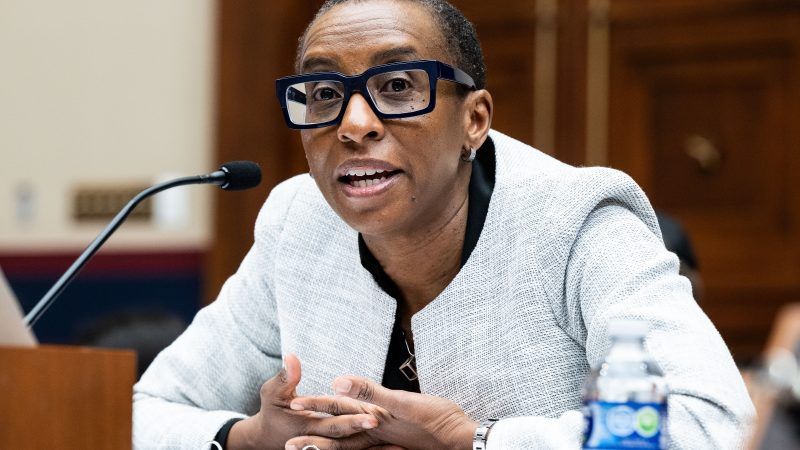Harvard President Claudine Gay Resigns After Plagiarism Scandal
The next president should put more effort into fixing the college's abysmal free speech ranking.

Harvard University President Claudine Gay announced her resignation on Tuesday, following scrutiny of her academic record, including numerous allegations that she plagiarized passages in her published works. Six additional examples of plagiarism were recently discovered by Washington Free Beacon reporter Aaron Sibarium.
These allegations are very serious and have led numerous commentators—including Harvard students—to conclude that she must be held accountable. Even The Harvard Crimson's editorial board, writing in support of Gay, nevertheless acknowledged that she had committed plagiarism and that the university's investigation had been inadequate.
But Gay's resignation barely mentioned the plagiarism scandal. Instead, she mostly nodded to the criticisms she faced in the wake of the House antisemitism hearings, in which she appeared callously dismissive of calls for genocide against Jewish people.
"It has been distressing to have doubt cast on my commitments to confronting hate and to upholding scholarly rigor—two bedrock values that are fundamental to who I am—and frightening to be subjected to personal attacks and threats fueled by racial animus," she wrote.
That was the only line in the resignation letter that touched on the plagiarism concerns. The rest of it concerns the environment on campus.
It's official. Claudine Gay is out at Harvard. Below is the letter that just got sent out. pic.twitter.com/8DotxIrfzc
— Dan Primack (@danprimack) January 2, 2024
It makes sense for Gay that she would lean into the hearing as the proximate cause of her ouster, because she is a more sympathetic figure when that event is considered in isolation. While her explanations of Harvard's speech policies in the face of relentless grilling by Republican political figures seemed tin-eared, it is in fact true that such policies are context-dependent; calls for violent political revolution are not necessarily violations of Harvard's policies—or of the First Amendment—unless they are directed at specific individuals. She should not have lost her job for articulating that.
Yet Gay is no free speech martyr. She may have defended provocative political speech at the House hearing, but her brief tenure at Harvard has not been marked by some dramatic return to free speech principles. In 2023, the Foundation for Individual Rights and Expression ranked Harvard dead last on its college free speech list. Indeed, one might conclude that in order to restore free speech to Harvard, different leadership is sorely needed.
In any case, the plagiarism allegations had teeth. Reporters discovered numerous instances of Gay lazily copying other scholars' exact passages without naming them and also failing to cite her sources. The political ideology of some of her accusers—including Christopher Rufo, a conservative writer and activist—makes no difference; Gay must be held to the same standards as other professors and students.
When Harvard's governing board picks the next president, they should look for someone who both abides by principles of academic integrity and vows to improve the college's free speech standing.


Show Comments (166)